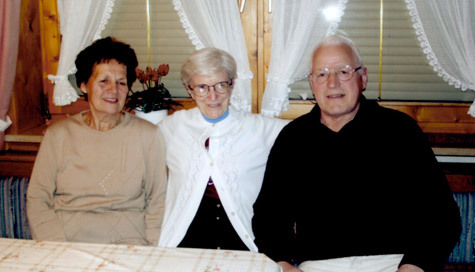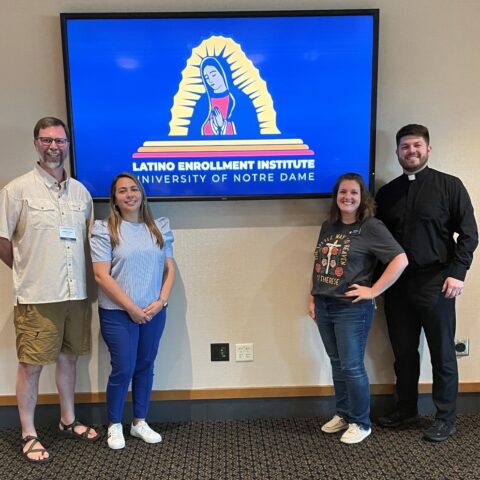FORT SMITH — On March 13, 1938, Adolph Hitler returned to the main square in Linz, Austria, the town where he had grown up, to announce Anschluss, the reunification of Austria and Germany, to an enthusiastic crowd of thousands shouting “Sig Heil.”
Only one local farmer, Franz Jagerstatter, voted against Anschluss. Five years later, he was beheaded for refusing to fight in the German Army.
Almost 70 years later, on Oct. 26, Jagerstatter was beatified as a martyr at St. Mary Cathedral in Linz at a Mass attended by 5,000 pilgrims, including Sister Rosalie Ruesewald, OSB, of St. Scholastica Monastery, and Immaculate Conception parishioner Kathy Jarvis.
 Jagerstatter joined army but later refused to fight Jagerstatter joined army but later refused to fight Click here |
The two women are local peace activists and attended the beautification through their connections to Benedictines for Peace, JustPeace and Pax Christi. While in Austria and Germany for several days, they met one of Blessed Jagerstatter’s daughters.
As they worshipped in the same cathedral that young Adolph Hitler had been confirmed in March 1904, they thought about how one man following his conscience in difficult times had become an example of courage for all Christians to follow.
“When other Austrians would say, ’Heil, Hitler,’ Franz would say, ’Gröss-Gott’ (Praise God!”) Sister Rosalie said.
Blessed Jagerstatter’s widow, Franziska, and his four daughters, one from a previous relationship, attended the beatification. His widow, now 94, rode to the cathedral in the sidecar of a motorcycle, in memory of her husband’s love of motorcycling.
“One of the highlights of the Mass was when Franziska kissed the small urn with his relics and handed it to the Cardinal (Jose Saraiva Martins),” Sister Rosalie said.
“I think Franziska, the wife, is also a martyr,” Sister Rosalie said. “She was denied state assistance after his death because of the controversy. She had to take care of the farm and raise the girls. She was young.”
Franziska Jagerstatter knew that her husband would be killed if he refused to fight in the army, but as he read and studied the Bible and prayed, she knew that he could make no other choice because he had to follow his conscience. He was not opposed to the military, but he was opposed to preemptive and unjust wars. He spoke to the bishop of Linz and his parish priest, and both urged him to think of his farm, his wife and his young daughters and to serve his country.
In his final letter to his wife the day before his execution, Jagerstatter wrote, “Dearest wife and mother. It was not possible for me to spare you the pain that you must now suffer on my account. How hard it must have been for our dear Saviour when, through his sufferings and death, he had to prepare such a great sorrow for his mother — and they bore all this out of love for us sinners. I thank our dear Jesus, too, that I am privileged to suffer and even die for him … May God accept my life in atonement not only for my sins but for the sins of others as well.”
Sister Rosalie said Blessed Jagerstatter did not judge the bishop, his pastor or his fellow Austrians for urging him to give up his solitary witness for peace.
“He said, ’God has given me the gift of seeing things as they are,”’ Sister Rosalie said. “He went to his death very peacefully.”
Sister Rosalie and Jarvis had the honor of staying with Blessed Jagerstatter’s youngest daughter and son-in-law, Aloisia and Richard Meier.
“The Rategund Guesthouse was full, and Pax Christi arranged for us to stay with the Meiers,” Sister Rosalie said. “Our trip was full of wonderful surprises like this.”
Following the beatification Mass, the pilgrims, including Pax Christi members from all over the world, took a tour of St. Rategund, the small town where Jagerstatter lived. They also visited the former prison where Jagerstatter was first held and the farm where he and Franziska raised their children, which is now a small museum.
The next evening the pilgrims traveled to Ostermiething to attend a peace vigil at the church in Blessed Jagerstatter’s home village. It was filled with liturgical dance, songs and speeches, but the most moving moment commemorated Blessed Jagerstatter’s dream.
“Franz saw a train going around a mountain in a dream,” Sister Rosalie said. “Everyone was jumping on, but he heard a voice saying, “Get off the train! This train is going to hell.” He was so sure that God was speaking to him.”
During the vigil, the parish children made a huge train moving up and down the aisles of the church. The children were asked, “Are you going to board the train to hell?” and each one answered, “Nein!”
Summing up their trip, Sister Rosalie said, “Franz Jagerstatter strikes me so powerfully as a model for our time. He followed his conscience when everyone was telling him not to.”
Jagerstatter joined army but later refused to fight
Blessed Franz Jagerstatter, who was beatified on Oct. 26 in Linz, Austria, was born on May 20, 1907, in St. Rategund, Austria. He was educated in a one-room schoolhouse, but became an avid reader with his step-grandfather’s encouragement.
According to a Vatican News Service article, he was a wild youth who was the first in his village to own a motorcycle, but after his marriage to Franziska in 1936, he began to grow in his faith. When he became the local sexton to supplement his farming income, he began receiving the Eucharist daily.
As many Austrians began to turn to Nazism, Jagerstatter reflected on his responsibilities to God and to his government.
He was inducted into the German Army in June 1940 and served on active duty from October 1940 through April 1941. Through his mayor’s intervention, he was permitted to return to the family farm, his wife and three daughters. When he was called to service again in February 1943, he announced his refusal to fight and volunteered to perform non-violent service. He was arrested and held in a local prison. After being transferred to Berlin, he was condemned to death for sedition in July and executed on Aug. 9, 1943.
On the eve of his execution, Jagerstatter wrote, “If I must write … with my hands in chains, I find that much better than if my will were in chains. Neither prison nor chains nor sentence of death can rob a man of the faith and his free will. God gives so much strength that it is possible to bear any suffering.”


